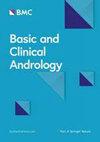The storage time of cryopreserved human spermatozoa does not affect pathways involved in fertility
IF 2
3区 医学
Q2 ANDROLOGY
引用次数: 0
Abstract
Cryopreservation of human spermatozoa is a widely used technique in the assisted reproduction technology laboratory for the storage of gametes for later use, for the fertility preservation and for sperm donation programs. Cryopreservation can cause damage to membrane, cytoskeletal, acrosome and increased oxidative stress, sperm DNA damage and transcriptome changes. To assess the impact of storage time on the transcriptome of frozen human spermatozoa, semen samples were collected from 24 normospermic donors of whom 13 had cryostored semen for a short-time (1 week) and 11 had cryostored semen for a long-time (median 9 years). RNA was extracted from each frozen-thawed sperm sample, randomized in pools, and analyzed by microarrays. Five transcripts were in higher abundance in the long-time respect to the short-time storage group. Functional annotation enrichment disclosed that that the length of cryostorage has no effect on critical pathways involved in sperm physiology and function. The storage time of cryopreserved human spermatozoa does not affect pathways involved in fertility.冷冻保存人类精子的储存时间不会影响生育途径
人类精子的冷冻保存是辅助生殖技术实验室广泛使用的一项技术,用于储存配子以供日后使用、保存生育能力和精子捐赠计划。冷冻保存会对精子膜、细胞骨架、顶体造成损伤,并增加氧化应激、精子DNA损伤和转录组变化。为了评估储存时间对冷冻人类精子转录组的影响,研究人员从 24 名精子正常的捐精者中采集了精液样本,其中 13 人的精液冷冻时间较短(1 周),11 人的精液冷冻时间较长(中位数为 9 年)。从每个冷冻解冻的精子样本中提取 RNA,随机分组,然后用芯片进行分析。与短期储存组相比,长期储存组有五个转录本的丰度更高。功能注释富集表明,低温贮藏时间的长短对精子生理和功能的关键通路没有影响。低温保存的人类精子的储存时间不会影响与生育有关的通路。
本文章由计算机程序翻译,如有差异,请以英文原文为准。
求助全文
约1分钟内获得全文
求助全文
来源期刊

Basic and Clinical Andrology
Medicine-Urology
CiteScore
3.50
自引率
0.00%
发文量
21
审稿时长
22 weeks
期刊介绍:
Basic and Clinical Andrology is an open access journal in the domain of andrology covering all aspects of male reproductive and sexual health in both human and animal models. The journal aims to bring to light the various clinical advancements and research developments in andrology from the international community.
 求助内容:
求助内容: 应助结果提醒方式:
应助结果提醒方式:


